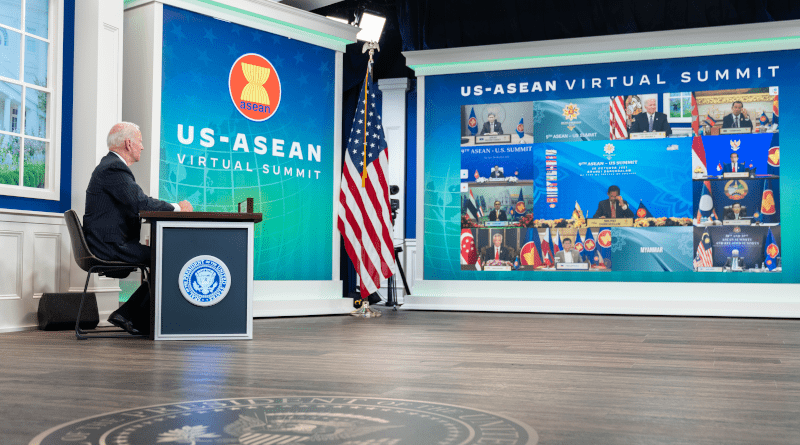China Looms Large Over US-Korea Security Cooperation In Southeast Asia
As tensions escalate over Southeast Asian regional disputes such as dams along the Mekong river and fishing rights in the South China Sea, some countries in the region are feeling forced to choose between the United States and the People’s Republic of China (PRC). But if that is the case, a key American official said during a recent East-West Center security dialogue, it is the PRC—not the United States—that is responsible.
“China’s increasingly aggressive behavior, frankly, is what I think has increased tensions in the region,” said Scott Walker, director of the US State Department’s Office of Korean Affairs, during the high-level online discussion on enhancing US-South Korea security cooperation in Southeast Asia. Speakers on the panel presented diverse views on ways the two countries could better collaborate with local partners in the region.
‘New Cold War mentality’
The shifting policies of the US have raised concerns in the region, suggesting a “new Cold War kind of mentality,” said Chiew-Ping Hoo, senior lecturer in the Strategic Studies and International Relations Program at the National University of Malaysia. Hoo said small countries like Malaysia do feel pressure from the US—for example, to check on certain North Korean ships that dock at its ports or to drop China communications giant Huawei over another company considered more acceptable to build its 5G network.
She said Southeast Asian countries want to get past that thinking to an environment of multilateral engagement, particularly regarding illegal fishing in the South China Sea. “We don’t have a single workable fishing agreement in Southeast Asia,” she noted.
South Korea’s Director-General for Southeast Asian Affairs, Eui-hae Cecilia Chung, said she was encouraged by President Biden’s attendance at the recent virtual summit of the Association of South East Asian Nations, or ASEAN. “Maintaining this momentum would be tremendously important,” she said. She pointed to a 2020 survey of ASEAN countries showing that more than 61 percent of respondents, if forced to choose, favored the US over China.
Regional flashpoints
China has long claimed the bulk of the South China Sea as its territorial waters, but tensions have increased with Malaysia, Taiwan, the Philippines, Vietnam, and other countries as more Chinese fishing fleets have entered southern waters in recent years.
Conflicts over fishing rights also exist among ASEAN members, said Scot Marciel, former US ambassador to several Southeast Asian nations and now a visiting fellow at Stanford University’s Walter Shorenstein Asia Pacific Research Center. Ideally, he said, ASEAN can take the lead on the issue, with the US and South Korea supporting the effort.
Use of the Mekong River poses another potential flashpoint. Chinese-built dams on the river are restricting the flows, posing a water security threat for the countries downstream that depend heavily on the river. “It gives China enormous leverage, the ability to basically turn off the top of the Mekong,” Marciel said. Not that China necessarily intends to do that, he added, but it is a source of leverage that needs delicate handling.
Marciel, who was US ambassador to Myanmar from 2016 to 2020, said the military coup there early this year established a “completely illegitimate and brutal junta” that is a threat to regional stability. He said the country is an exporter of refugees as well as the largest producer of methamphetamines in the world. The US and South Korea can work cooperatively to put pressure on the military to give up its authoritarian rule, he said, which is opposed by the majority of the population.
Panel moderator Dr. Victor Cha, professor of government and vice dean at Georgetown University, pointed out that South Korea will be holding presidential elections in March, and asked if South Korea should be more outspoken about China’s activities in Southeast Asia. Korea may not be as vocal as it could be, Chung responded, but it consistently signals to China that stability is important and urges it to refrain from heightening tensions in the area.

